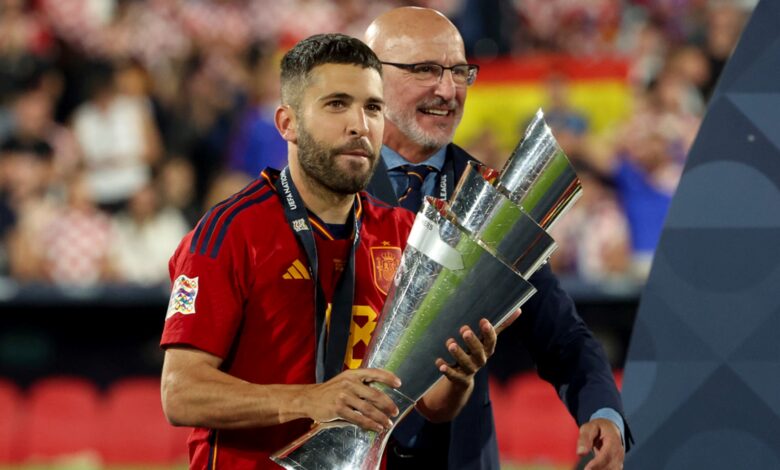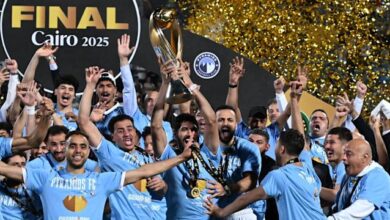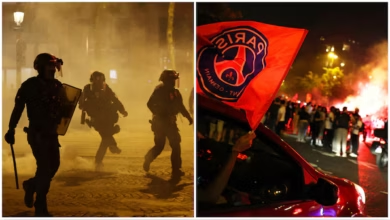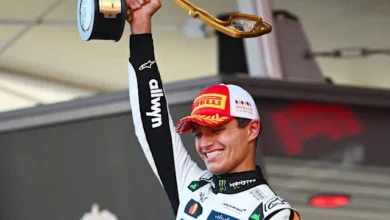Spain’s Nations League Triumph Calms Fears

SPAIN coach Luis de la Fuente has quelled the doubts around him by leading his country to Nations League glory and ending a decade-long trophy drought.
La Roja needed penalties to see off Croatia and triumph in Rotterdam, but doing so helped ease tensions following their Euro 2024 qualifying defeat by Scotland in March.
De la Fuente’s appointment by the Spanish Football Federation to replace Luis Enrique raised eyebrows — the 61-year-old is a relative unknown as a coach, having worked within the country’s youth ranks from 2013 onwards.
After an unconvincing performance in a win over Norway in his opening game, defeat in Glasgow sparked alarm.
However, matches three and four proved far more enjoyable for the coach, beating Italy and then Croatia to lift the cup.
The king of Spain, Felipe VI, welcomed the team home at Zarzuela Palace on Monday after they earned their first trophy since Euro 2012.
That conquest, along with World Cup 2010 and Euro 2008, was a golden era for Spain, which all future teams are judged against.
Although the Nations League is a new competition, this is only its third edition, Spain and De la Fuente are hopeful that it can prove a springboard for more success, with the waters now more tranquil around him.
“All projects are better constructed on a base of victory and this gives us more strength, confidence, and calm,” said the coach. Federation president Luis Rubiales defended De la Fuente and said stories that he considered ousting him were false.
“The coach has always been very secure, and we believe in him to the maximum,” Rubiales told reporters on Sunday.
“We have no problem, the coach has always been 100 percent in his job, and we have always trusted him.
“He’s been at 100 percent since the beginning. Starting a new project is hard, and with new players, so young — that’s hard too.”
Rubiales pointed out winning the Nations League meant beating Europe’s top teams, with England, France, Germany and Portugal eliminated by the final four.
With reduced concerns around his capability, attention has turned to how the coach’s side is shaping up to mark Spain’s new era.
One of De la Fuente’s biggest choices has been a shift to a 4-2-3-1 formation, instead of Spain’s typical 4-3-3.
The key cog is Manchester City midfielder Rodri, who was named the player of the Nations League finals.
While Luis Enrique drew criticism for playing Rodri as a centre back at the 2022 World Cup to make room for veteran Sergio Busquets, his successor has reinstalled him in the centre of the pitch.
Rodri, arguably the best in the world in his position, linked well with Mikel Merino against Italy and then Fabian Ruiz against Croatia.
The 26-year-old, who scored City’s Champions League final winning goal in Istanbul against Inter Milan earlier in June, has even been touted as a potential Ballon d’Or winner.
Speaking with clarity and confidence and leading by example on the pitch, Rodri has become his country’s torchbearer.
“This generation promises a lot,” he said after the Nations League triumph. Before, he had called for Spain to start a new winning cycle.
Rodri’s emergence as the team’s “frontman” is in part due to an absence of star power in the attack, with Spain boasting a host of dangerous — but not elite — forwards.
Barcelona’s Ansu Fati was bright off the bench against Croatia and showed he can have a big impact if he can stay fit, while Yeremy Pino, Dani Olmo and Marco Asensio are all similarly bright, but inconsistent.
Alvaro Morata has played at many of Europe’s top sides without fully convincing, while back-up striker Joselu has just joined Real Madrid, his career best form coming at the ripe age of 33.
Spain could not find a breakthrough against Croatia and needed penalties to triumph, which De la Fuente said added extra spice to the victory.
“We deserved to win before, but the penalties give it a dash of the epic,” said the coach, who expects to continue thriving.
“Obviously, winning gives you more shine, and I expect more joy to come in the future.”





